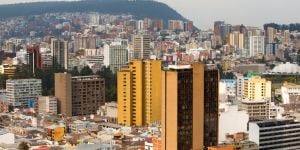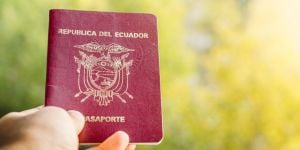Here is the original article, translated by Google.
The immense success of mobile money products, such as M-Pesa, which first took off in Kenya, inspired dozens of imitators worldwide. Many countries in Africa, Asia and Latin America now have services that allow people to save and transfer money from their mobile. But there is something different about the new electronic cash system of Ecuador. It is operated not by a private telephone or finance company, but by the leftist government of that country.
Lime products is M-Pesa were applauded by incorporating millions of people into the formal financial system, allowing trade between people have in different places and reducing theft and tax evasion. But Diego Martinez, an economist at the Central Bank of Ecuador, said that the government wanted its own service because he believes it can reduce transaction costs that come with private offerings.
"We did it from the government because they wanted it to be a democratic product. In any other country provided by private companies and expensive. There are barriers to entry such as [higher rates] if money from one mobile operator to another is transferred. The we have here is something that anyone can use regardless of which operator they have, "he says.
With this program, anyone can go to a participating bank and change your cash for electronic money that is stored on your phone. Then they can use it to make payments to other people or to buy goods and services. For example, taxi drivers in the capital, Quito, accept payments through the system.
Launched in February, 47,800 people have already used the system, she says Martinez. Twelve banks, both public and private, are becoming the cash and others are expected to join over the next six months (the government intends to raise tariffs it pays banks to cooperate). But so far, the system is not being as successful it could be, so the lack of knowledge as rumors about the purpose of the idea. Some critics have argued that electronic money is a government attempt to reduce dependence on the US dollar, which is the currency of the country after Ecuador was forced to abandon its own currency, the sucre, in 2000.
"In recent months there was a campaign against the system," says Martinez. "They said they want to replace the dollar as currency and some people panicked, because he believed that banks would close its doors. It was political. Now they understand that we do not want to replace the dollar will start to use it more," he adds.
Critics seem to have only partially right about the government's intentions. The digital cash system is an effort to reduce the physical use of dollars, the central bank has to bring the United States to replace expired tickets. That's expensive: Ecuador spends at least US $ 3 million a year in recycled money. On the other hand, all transactions made through the system are denominated in dollars. The government, in other words, is not replacing dollars, but simply promoting a paperless version of them.
The fee for using the service is two cents for amounts of between US $ 1 and US $ 10-10 cents for amounts of between US $ 301 and US $ 2000. That, incidentally, seems less, in relative terms, that which takes M-Pesa.
In theory, countries could completely eliminate cash and all its disadvantages. But Martinez believes it will be decades before that happens in Ecuador, because cash is still used in 40% of the payments and the use of cash among the poorest, particularly in rural communities populations, remains high.
Off electronic money will depend on whether banks or other agents agreed to convert cash and if people have places where you can use the digital money. Despite the success of M-Pesa, many mobile money systems also did not grow dynamically because people do not see the benefits or leave the cash distrust. As with any financial product, the decisive factor is not necessarily the technology. It is the confidence of the people.
lanacion.com - sea, October 13, 2015 12:26 AM EDT
 Food in Ecuador
Food in Ecuador Opening a bank account in Ecuador
Opening a bank account in Ecuador Healthcare in Ecuador
Healthcare in Ecuador The Working Holiday Visa for Ecuador
The Working Holiday Visa for Ecuador Work in Ecuador
Work in Ecuador Family and children in Ecuador
Family and children in Ecuador Leisure activities in Ecuador
Leisure activities in Ecuador Permanent Residency in Ecuador
Permanent Residency in Ecuador



